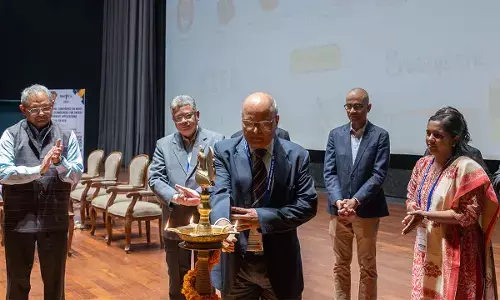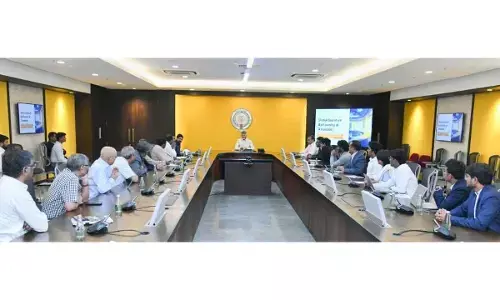Importance of delivering sustainable business practices to MBA students

MBA students are the future leaders and decision-makers of the business world, and it is crucial that they are equipped with the knowledge and skills to navigate a sustainable path. B-schools need to inculcate practice-advocacy-research (PAR) framework to prepare students on sustainability.
Envisioning the future of India is intrinsically linked to the idea of a ‘net-zero world’ by 2050. Working towards a net-zero world is important not only for the business, but it is critical for the survival of human race on earth. The urgency of the situation is evident from the fact that more than 70 countries, constituting about 80 percent of global CO2 emissions and about 90 per cent of global GDP, have put net-zero commitments on the table and more than 5,000 companies joined as part of the United Nations’ Race-to-Zero campaign. India’s commitment to climate change mitigation is not lagging behind as thetransition to carbon neutral economy and promotion of circular economy have been kept at the top of the priority list.
The transition in the context of net-zero, will see a global shifts in demand, capital allocation, costs, and jobs. Management education cannot be a silent spectator, rather it needs to gear up and embed knowledge, skills and attitudinal changes suitable to changing market and industry needs for a net-zero context. The New Education Policy (NEP) 2020 takes into cognizance the globalconcern of inclusive and equitable qualityeducation which promotes lifelong learning for all as enshrined in the Sustainable Development Goals (SDG 4) of 2030 agenda.This makes it imperative for management education to focus on preparing MBA students on sustainability practices.
Preparing for global challenges
The challenges faced by business today are increasingly global in nature. The unprecedented challenges demand a re-evaluation of traditional business models. Climate change is no longer a peripheral concern but a central issue that businesses must address. Understanding the interconnectedness of economic, social, and environmental factors is vital for businesses to contribute positively to society while ensuring long-term profitability.For example, according to McKinsey report on sustainability and de-carbonization, the net-zero transition alone could generate a whooping business opportunity to the tune of estimated $9 trillion to $12 trillion in annual sales by 2030. Decarbonizing operations and product offerings present many companies with the most significant opportunity, however, of course with its own challenges. Climate change, resource scarcity, and social inequality are issues that affect companies across borders. Teaching sustainable business practices ensures that MBA graduates are equipped to address these challenges on a global scale.
ESG reporting and role of b-schools
With the ESG reporting (Environmental, Social and Governance) hitting the board room agenda, industry looks to academia for help in meeting new reporting requirements. This presents big opportunity for B-schools graduate as not many companies have been found to be ready on ESG reporting. According to a recent Deloitte poll, only about 45% professionals felt confident and ready for ESG reporting, while only 16% admitted that they have a full time professional dedicated to ESG. The possible opportunity for MBA students are as follows:
l ESG reporting process development and integration
l ESG reporting and compliance
l Data management and analysis
l ESG risk management
Framework & scopes for b-schools
The commitment of B-schools towards sustainability need to go beyond teaching and curriculum. It is also about making impact through practices, advocacy and research (PAR). The UN-PRME (United Nations Principles for Responsible Management Education) provides guidelines which a B-school can look at and embrace at different levels. Many B-schools in India are already a signatory to UNPRME, and student community joined this global platform. Following PAR framework, B-schools are adopting SDGs (Sustainable Development Goals) and reinforcing it through teaching, learning, campus practices, advocacy and research.
l Teaching Sustainability: Sustainability gets incorporated as part of curriculum and a credit course is offered to students. This may also be adopted in a workshop mode as part of core module. B-schools are also adopting sustainability mindset as a competency goal for MBA students.
l Practice & Advocacy: Models of campus practices are available and many B-schools seem to have adopted green-practices as part of campus management. Student groups through clubs and committees act as the sustainability ambassador and reaching out to spread the message to various sections of the society.
l Research: Center of Excellence on sustainability and a systematic approach towards faculty engagement through research, especially in collaboration with industry, can go a long way in serving the cause. This will also impact MBA teaching and preparing students for sustainable business.
In conclusion, we can say, that in our visualization of India at 100 in 2047 with 8 percent GDP growth rate, creating 90 million jobs by 2030 and investing average annual $600 billion to a net-zero world by 2050, it has to be a model of sustainable economic growth and business. As McKinsey’s senior partner and India managing partner RajatDhawan was rightly quoted in a recent insight article, “We call it the sustainable and inclusive growth model, where resilience is built into it.” It is this insight that B-schools would prefer to look at and prepare MBA students for career and life.
(The author is Director, Jaipuria Institute of Management, Jaipur (Rajasthan)














